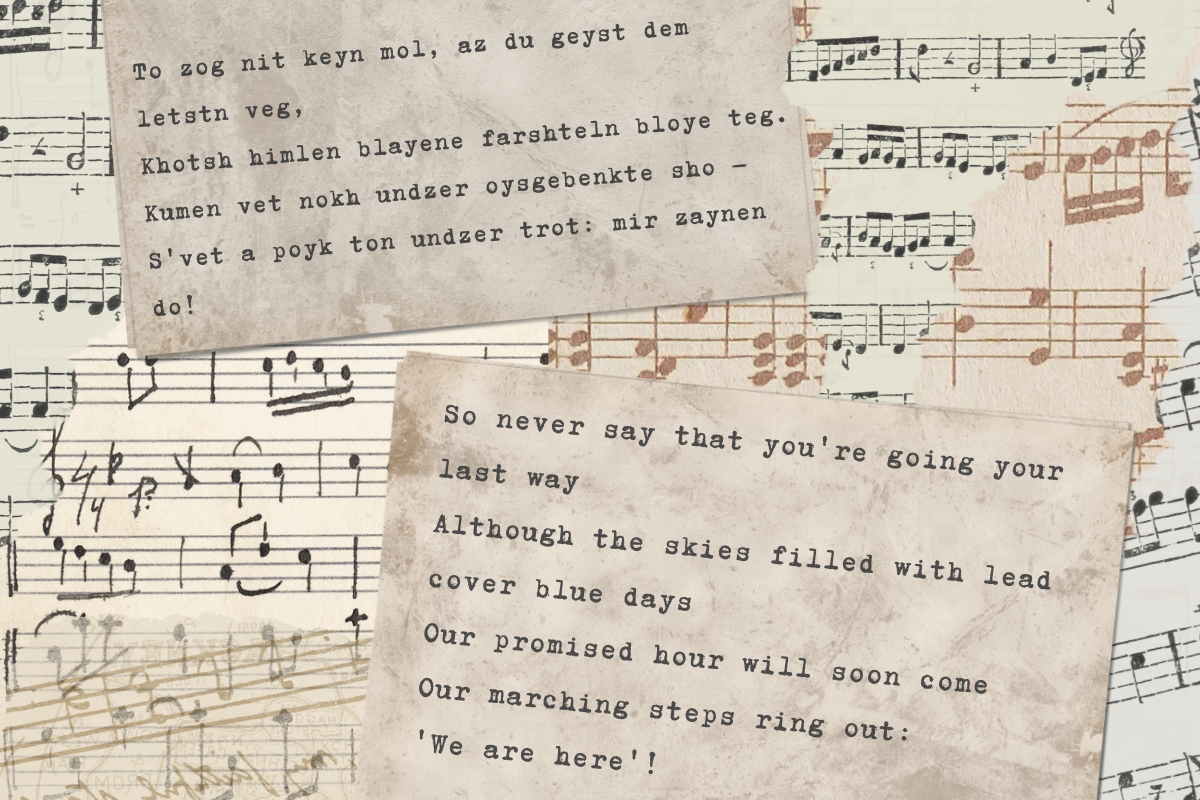Editor’s note: This article was republished on May 6, 2024 in honor of Yom Hashoah.
When I was in 10th grade, my chapter of the international Jewish teen choir HaZamir was asked to sing at our city’s annual Yom Hashoah ceremony, an evening of recognizing the calamity of the Holocaust, celebrating its heroes and honoring those who survived. Together we compiled a repertoire which included beautiful Hebrew songs and our rendition of Mi Sheberach, the Jewish prayer for healing. Our conductor also gave us a short Yiddish song called “Zog Nit Keyn Mol.”
The song was new to us, but its history ran deep. Translating to “Never Say,” it is the song of the partisans, the Jewish resistance movements that fought the Nazi regime. Yiddish was a language many of us carried in our hearts but spoke little of besides the words in the common Jewish English lexicon. Learning the song was difficult, and we became deterred, uninterested in singing. We practiced the Yiddish words over and over again, merely trying to memorize and not taking in the meaning or why we were asked to sing this song.
Just before the ceremony, we went to a classroom in the back of the synagogue to rehearse. As we began “Zog Nit Keyn Mol,” an older woman walked by and stood in the doorway, tears welling up. When we finished, she came in and told us that she was a Holocaust survivor, and she used to sing this song at her elementary school in Germany after the war. It reminded the Jewish community that they were strong — they survived one of the worst atrocities in human history — and would not be silenced. She then told us she had never heard anyone sing “Zog Nit Keyn Mol” since moving to the United States. In fact, she didn’t even realize that people still knew it. It meant the world to her to hear people — young people — singing this song as she did decades ago.
With tears in our eyes, we went out to the ceremony and sang with a new sense of purpose. “Zog Nit Keyn Mol” is not simply an old Yiddish song, it is the Holocaust survivors’ anthem. It was a poem written by Lithuanian teenager Hirsch Glick while living in the Vilna Ghetto in 1943. He set it to music by Russian composer Dmitry Pokrass and it quickly spread throughout Europe to different camps, ghettos and partisan communities. In an interview with Dolph Klainberg as part of the Yiddish Book Center’s Oral History Project, he roughly translates and shares the meaning of the song: “Never say that the skies are leaded. The hour will come when our steps will be heard that we are here.” Its message of hope, not giving up and holding out for a better future have become the song of Holocaust survivors, their descendants and the Jewish community.
As we sang, the audience started to join us. I saw the mix of sadness and joy in their faces, childhood memories unlocked, for better or worse. Singing “Zog Nit Keyn Mol” suddenly felt more beautiful than any of our other melodious songs. This one mattered most. When asked to sing at the ceremony again the following year, we begged our conductor to sing this song. It was our way of acknowledging the survivors’ past and pledging to continue sharing their story. It became our favorite part of the ceremony.
Following pandemic hiatus, the Yom Hashoah ceremony is back in full swing. I am singing as an alumna of the choir, helping an entirely new group of teens prepare. When asked to sing “Zog Nit Keyn Mol,” they met it with the same apprehension my group had, wondering why it mattered to sing such an old Yiddish song. In perfect, unexplainable timing, another alumna’s Holocaust survivor grandmother walked into the room. “This song is important to us,” she said. “They will want to sing along with you. It is our march and our anthem, and each year as the number of Holocaust survivors become fewer, it becomes more important.” The choir’s demeanor changed, and they carried on rehearsing with a newfound purpose, ready to perform from the heart.
While the whole message of “Zog Nit Keyn Mol” is important, my favorite part of the song is its ending. The lyrics “s’vet a poyk ton undzer trot: mir zaynen do!” have been translated many different ways, some versions as “our marching steps will thunder: we are here!” and others with “mir zaynen do” as “we survive.” I like to hold both together, interpreting it as we are here and we are surviving. In the face of more recent antisemitism, these lyrics continue to ring true.
“Zog Nit Keyn Mol” is an important piece of Holocaust survivors’ history — and our history — and an everlasting call to action, recognizing their fighting spirit in surviving tragedy and living despite everything. We are here, surviving, and will not give up hope of creating a better world. We will sing out loud and proud.



